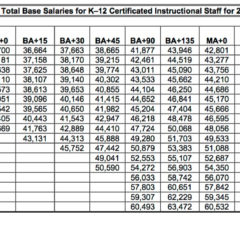If you walk into a doctor’s office and learn that your physician is board certified, this designation communicates something to you…even if at first blush you aren’t sure what it means. In the field of medicine, board certification is voluntary, is assessed against established industry standards (based on specialty as well), and is an widely accepted indicator of professional capacity. From the American Board of Medical Specialties website:
When you choose a doctor who is Board Certified by one of the ABMS Member Boards, you can be confident he or she meets nationally recognized standards for education, knowledge, experience and skills to provide high quality care in a specific medical specialty. Board Certification goes above and beyond basic medical licensure.
Sounds much like National Board Certification for educators.
There is ample research indicating that teachers who have achieved National Board Certification produce enhanced student learning equivalent to between one and two additional months of instruction, particularly with students who are typically underserved.
Education funding in Washington is certainly in dire need of improvement, and one aspect of this involves compensating teachers in a way which (1) draws high quality candidates into the profession and (2) recognizes and values the research-supported professional growth that NBPTS certification represents.
As a result, dozens of National Board Certified Teachers (NBCTs) convened in SeaTac this last Saturday at the 2016 NBCT Policy Summit. These educators were called together by WEA, CSTP and OSPI in order to do what Washington Ed legend Jeannie Harmon says is the best way to change education for the better: Get our best and brightest educators together, tell them the problem to be solved, then get out of their way.
Currently, teacher salaries are funded separately from the incentive program aimed at fostering NBPTS certified teachers: Our base salary allocation model (SAM) includes increases in compensation aligned with advanced degrees and acquisition of clock hours for learning, and but does not include NBPTS certification…which of the three (degrees, seat time, or NBPTS certification) is the one with the greatest body of research supporting an increased impact on student learning. The current incentives include a yearly bonus for being an NBCT, plus an additional bonus if you are an NBCT working in a “challenging school,” both of which are funded outside our SAM. The result? The funding is tenuous, and the incentive toward and recognition of NBPTS certification is likewise ever on the chopping block.
The recommendations will be presented in full soon (as of this writing it’s been barely 24 hours since the end of the summit), but on the policy issue related to NBPTS certification, the recommendation was loud, clear, and simple: Just as a Masters degree and a Doctorate represent lanes of professional growth on our salary schedule, so should National Board Certification. Parallel to this recommendation were a variety of policy recommendations around revenue generation for the state (in order to fully fund education and meet the legal requirements of the McCleary ruling). There was also significant talk about developing and compensating new and varied career paths for teachers who don’t aspire toward being a program director or principal, particularly since there is recent evidence of the positive impact of teacher leadership.
Hidden within all this is a quiet evolution of what the professional continuum for teachers might look like. In medicine the pursuit of board certification, while still voluntary, is much more integrated into the vision of how a professional physician learns, performs, and refines their craft over their career. National Board Certification is heavily studied and has proven to be a form of professional advancement that has a positive impact on students. It only makes sense that this step be codified into our compensation schedule alongside the other (still voluntary) professional steps such as advanced degrees.

“Through National Board Certification, the National Board for Professional Teaching Standards seeks to identify and recognize teachers who effectively enhance student learning and demonstrate the high level of knowledge, skills, abilities and commitments reflected in the following Five Core Propositions.”
Perhaps more than identification and recognition, the process typically forces teachers to grow. I know that in my case it made me become a better teacher: more focused on student learning outcomes than I had ever been. It’s no surprise that the data shows certification enhances student learning – that’s its central focus.
Great take-away from the Summit, Mark. And now the challenge looms: how to convince the Legislature that funding the stipend is important in the “Year of McCleary” and should be made permanent via a separate column.